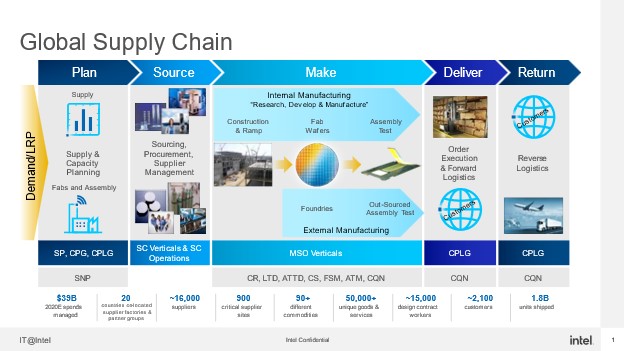Lessons Learned, Path Forward
SECOND EDITION
By Michael Millane
Arizona, USA
ABSTRACT
As with many IT organizations within companies started in the last century, Intel IT had a strong legacy of waterfall program and project management practices, small pockets of agile development teams and emerging DevOps practices with mixed results and limited visibility. Starting in 2019, Intel IT started our path implementing an industry-standard scaled agile framework amidst a broader digital transformation initiative. As we progressed through identifying our development value streams, launching our agile release train teams and then implementation of lean portfolio principles, we have observed and learned many benefits, as well as the limitations of leveraging a scaled agile framework. The framework allowed our organization to enhance business transparency, stabilize operations, increase focus on reducing aging infrastructure and reinvigorated disciplined project execution. While those benefits were impactful, we also encountered challenges in executing large, complex initiatives, obtaining a clear portfolio demand prioritization and integrating our operating model with broader corporate processes.
Background
Intel operates a global Supply Chain that is only increasing in complexity due to the more complicated nature of the emerging modular products, our increased reliance on external manufacturers / suppliers and the constraints driven by the pandemic.
The Supply Chain network is spread across 20 countries, engages greater than 16,000 supplier and sources, builds and distributes more than 50,000 unique products

Figure 1: Intel Global Supply Chain
The Information Technology context
In 2019, the Supply Chain IT was facing challenges and looking to support the company’s inflight supply chain transformation. The teams have faced reorganizations of the IT department and experienced some workforce reductions that reduced our employee capacity at a time when business demand to the IT organization was increasing.
The applications and capabilities that support our supply chain business are a mix of enterprise resource planning (ERP), industry standard platforms and a larger number of custom applications that drive challenges in both IT operational support and project execution velocity and delivery.
IT operations were consistently below the overall, aggregate target service level agreement (SLA) which were only exacerbated by the capacity reductions. In addition, there was a significant number of major incidents which resulted in a large amount of business downtime and impact.
Project execution was also seen as lacking with both large and smaller initiatives missing commitments to the stakeholders. In summary, the operational, project issues in a resource constrained environment seemed daunting but a new approach was required.
More…
To read entire paper, click here
Editor’s note: Second Editions are previously published papers that have continued relevance in today’s project management world, or which were originally published in conference proceedings or in a language other than English. Original publication acknowledged; authors retain copyright. This paper was originally presented at the 9th Annual University of Maryland PM Symposium in May 2022. It is republished here with the permission of the author and conference organizers.
How to cite this paper: Millane, M. (2022). Scaled Agile Implementation – Lessons Learned, Path Forward; presented at the 9th Annual University of Maryland Project Management Symposium, College Park, Maryland, USA in May 2022; republished in the PM World Journal, Vol. XI, Issue X, October. Available online at https://pmworldlibrary.net/wp-content/uploads/2022/10/pmwj122-Oct2022-Millane-scaled-agile-implementation-lessons-learned-2.pdf
About the Author

Michael Millane
Arizona, USA
![]()
Michael Millane received his Bachelor of Science in Engr from Cornell University and an MBA in Information Systems Management from the University of Texas at Austin. Michael started his career in healthcare but has spent the last nearly 30 years in the high tech Industry at Intel Corporation. He has 30 years of IT-related experience as a Program Director in a variety of business domains: Supply Chain, Finance, Human Resources, Cybersecurity and Intel’s Corporate Data Office. Michael can be contacted at michael.millane@intel.com









